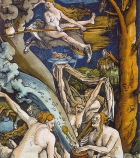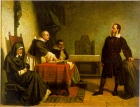Europe
Some of Europe’s most famous leaders govern in the early modern period. Napoleon, Peter the Great, and Charles XII change and challenge Europe. Religion and religious ideas are transformed as new ideas move across Europe developing science, economics and culture, all of which are covered in this section. Read more
Sort by:
Date (Newest first) | Title A-Z
Show:
All |
Articles |
Podcasts |
Multipage Articles
-

Why did regional variations exist in the prosecution of witches between 1580-1650
ArticleClick to view -

Hungarian Nationalism in International Context
ArticleClick to view -

William the Silent: the first tolerant Prince
ArticleClick to view -

Catherine de' Medici and the French Wars of Religion
ArticleClick to view -

Philip II of Spain: The Prudent King
ArticleClick to view -

The New History of the Spanish Inquisition
ArticleClick to view -

The Spanish Armada of...1597?
ArticleClick to view

